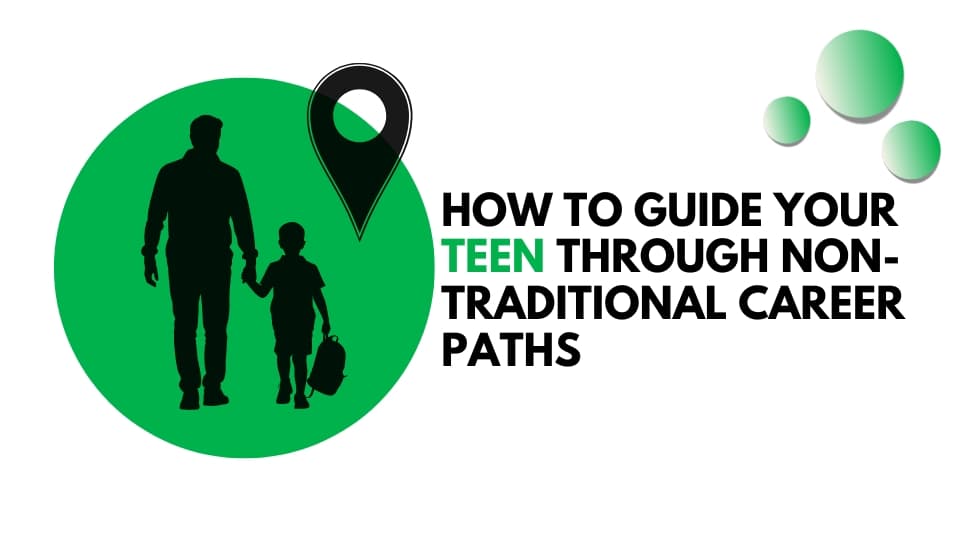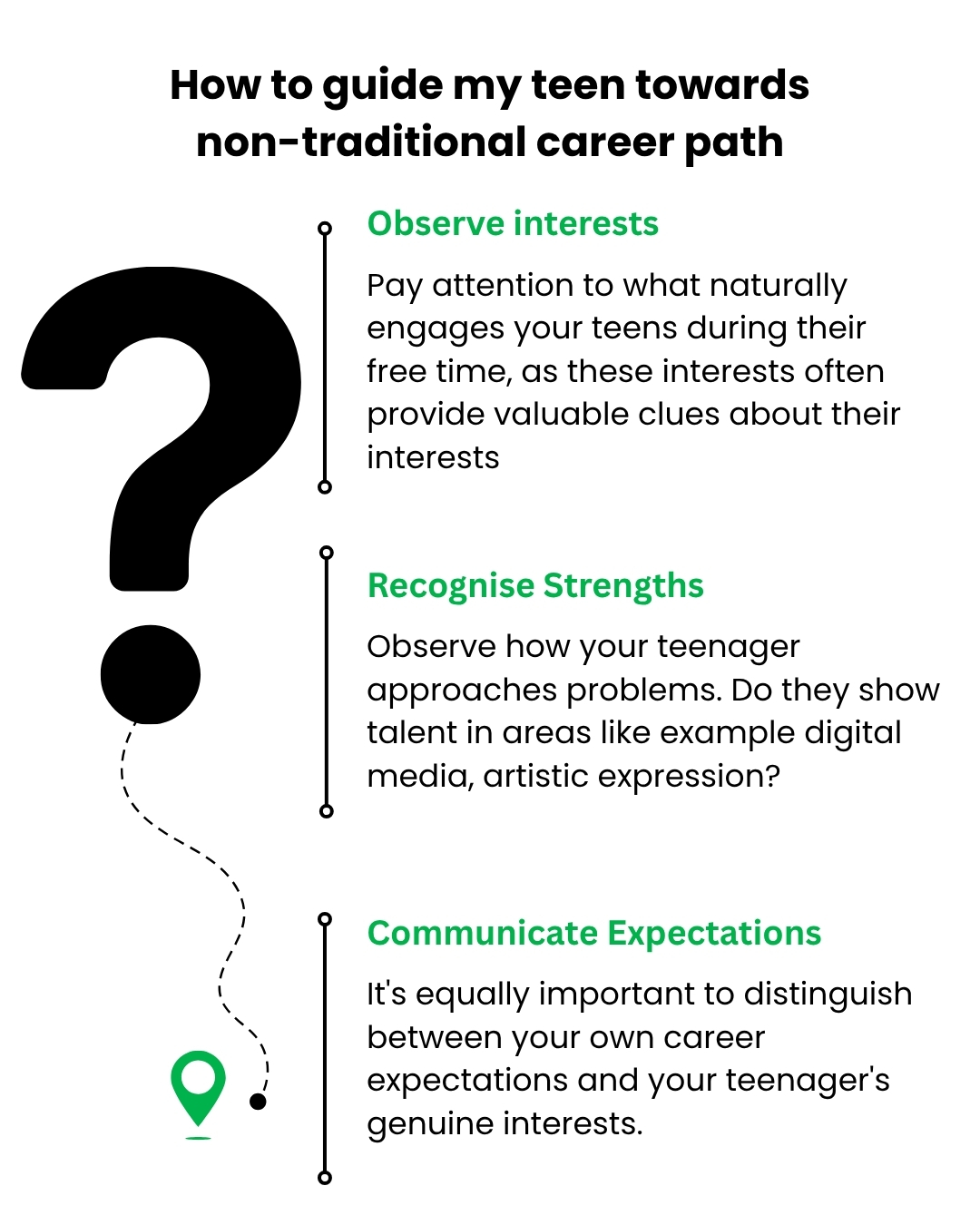
October 08th, 2025 • 8 mins read
How To Guide Your Teen Through Non-Traditional Career Paths
The landscape of career opportunities has undergone a dramatic transformation in recent decades. While previous generations often followed predictable, mainstream and stable paths, today's teenagers face a world where non-traditional careers are not only viable but increasingly essential to economic growth and innovation. As parents, it’s important to stay open-minded and guide your child wisely through these choices.
Understanding the Modern Career Landscape
In the past, careers often followed a steady, step-by-step path within one industry. Today, that model is fading as new fields emerge and young people explore multiple career directions. Today's economy increasingly values entrepreneurship, creativity, and specialized skills that may not require conventional four-year degrees.
Research indicates that the gig economy (short-term, flexible jobs or projects) alone is projected to comprise over 50% of the workforce by 2027, fundamentally changing how we understand career stability and success (Smith & Johnson, 2023). This shift represents both opportunity and challenge for families planning their teenagers' futures.
Non-traditional careers encompass a broad spectrum of possibilities, from digital content creation and e-commerce entrepreneurship to skilled trades, artistic pursuits and technology-focused roles that didn't exist a decade ago. These paths often offer flexibility, creative fulfillment and potential financial rewards, though they may also involve greater uncertainty and require different types of preparation than conventional careers.

Recognizing Your Teen's Unique Strengths and Interests
The foundation of successful career guidance lies in understanding your teenager's individual strengths, interests and learning styles. Unlike traditional career paths that follow pre-determined academic qualifications, non-traditional careers often reward passion, creativity and specialized skills. Pay attention to what naturally engages your teens during their free time, as these interests often provide valuable clues about their interests and potential career paths.
Observe how your teenager approaches problems:
- Do they demonstrate entrepreneurial thinking or innovative solutions to everyday challenges?
- Are they drawn to hands-on learning experiences rather than rote learning?
- Do they show talent in areas like digital media, artistic expression?
These observations can help identify career paths that align with their natural abilities.
It's equally important to distinguish between your own career expectations and your teenager's genuine interests. Many parents, without realizing it, push their children toward careers based on their own past experiences or dreams they couldn’t achieve. Creating space for honest dialogue about career preferences is crucial.
Building Essential Skills for Non-Traditional Success
While non-traditional careers may not follow conventional pathways, they still require foundational skills that parents can help cultivate.
- Digital literacy has become increasingly crucial across virtually all career fields, from basic computer proficiency to more specialized skills like social media marketing, content creation and data analysis. Encouraging your teenager to develop these skills through online courses, workshops, or self-directed learning can provide significant advantages.
- Communication skills remain paramount in any career path, but they take on particular importance in non-traditional fields where networking and self-promotion often determine success. Help your teenager develop confidence in presenting their ideas, whether through public speaking opportunities, writing experiences or collaborative projects. These skills translate directly to entrepreneurial ventures, freelance work, and creative industries.
- Financial literacy deserves special emphasis when considering non-traditional careers, as these paths often involve irregular income, self-employment taxes and the need for personal financial management. Teaching your teenager about budgeting, saving, investment basics and business finance can provide crucial preparation for careers that don't include traditional employee benefits.
Navigating Educational Alternatives
Traditional four-year college education may not be the optimal preparation for many non-traditional careers. Alternative educational pathways, including trade schools, online certification programs, internships and portfolio-based learning, often provide more relevant and cost-effective preparation. Research demonstrates that students who pursue career-focused training aligned with their interests show higher engagement and better outcomes than those following generic academic tracks (Williams et al., 2022).
Consider exploring programs that offer specialized training in emerging fields, industry-specific certifications or programs that combine learning with practical experience. Many entrepreneurs and creative professionals have built thriving careers through self-directed learning, online resources, and practical experiences.
The key is to stay open-minded and understand that learning doesn’t always follow a straight or fixed path. Your teenager might even benefit from taking a gap year to explore interests through internships or travel, pursuing part-time education while gaining practical experience or combining traditional academics with specialized training in their area of interest.
Creating Support Networks and Mentorship Opportunities
Non-traditional careers often lack the structured support systems found in conventional professions. As a parent, you can play a crucial role in helping your teenager build networks and find mentorship opportunities within their areas of interest. This might involve connecting them with professionals in relevant fields, encouraging participation in industry-related communities or events or supporting their involvement in projects that provide real-world experience.
Professional associations, local business organizations and online communities related to your teenager's interests can provide valuable networking opportunities and industry insights. Many professionals in non-traditional fields are willing to share their experiences with motivated young people, particularly when approached through appropriate channels.
Consider encouraging your teenager to seek internships and volunteer opportunities in fields that interest them. These experiences provide practical insights into career realities while building professional relationships.
Managing Uncertainty and Building Resilience
Non-traditional career paths often involve greater uncertainty and require tolerance for risk than. Help your teenager develop realistic expectations about the challenges they may face, including irregular income, the need for continuous skill development and the importance of adaptability in a rapidly changing world of work.
Building resilience and problem-solving skills becomes particularly important in careers that lack traditional institutional support. Encourage your teenager to view setbacks as learning opportunities rather than failures, and help them develop strategies for managing stress and maintaining motivation during difficult periods.
In Conclusion..
Guiding your teenager through non-traditional career exploration requires balancing support with independence, providing resources while encouraging self-direction and maintaining open communication about both opportunities and challenges. The key lies in focusing on your teenager's individual strengths and interests while helping them develop the practical skills and resilience needed for success in an evolving economy.
Remember that career paths are increasingly flexible, and the skills and experiences your teenager gains while exploring non-traditional options will serve them well regardless of how their professional journey evolves. By providing thoughtful guidance while respecting their autonomy, you can help your teenager build a fulfilling career that aligns with their unique talents and aspirations.
How to Choose a Career: 6 Self-Reflective Activities for Intermediate Students
Self-Discovery: The Foundation of a Meaningful Career
References
Smith, A. R., & Johnson, M. L. (2023). The evolving gig economy: Implications for workforce development and career planning. Journal of Career Development, 45(3), 234-251. https://doi.org/10.1177/0894845323000123
Williams, K. S., Chen, L., & Rodriguez, P. (2022). Alternative pathways to career success: A longitudinal study of non-traditional educational approaches. Educational Psychology Review, 38(2), 412-435. https://doi.org/10.1007/s10648-022-00689-4